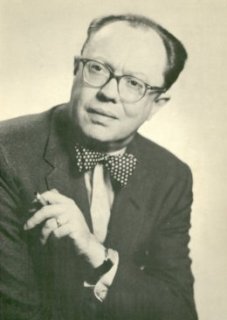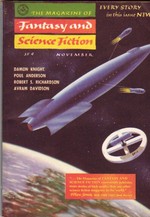The following is a one-page story submitted to Anthony Boucher, the editor of The Magazine of Fantasy and Science Fiction, in April 1956, when I was 13, and accepted by him the following month, after a couple of rewrites guided by his suggestions. (The use of the drug “euphorin” was his own idea and invention.) Later that summer, on a family trip to the west coast, we (my parents and one or two of my brothers and I) actually managed to track down Boucher in his Berkeley home (we’d naïvely assumed that the address on his stationary was the magazine’s editorial office) and spent a very pleasant hour or so with him. The story was eventually published in the November 1957 issue (on the last page) and I received a check for $25 for my work. Later the story appeared in Spanish and Japanese translations in foreign editions of the magazine; I still have a copy of each. — J.R.
Now and Then
by Jonathan Rosenbaum
When the time machine started, I realized that I had forgotten to ask the professor its destination. But under the influence of a heavy dose of euphorin, it hardly mattered to me. To escape the tensions of the present, almost everybody I knew was taking the same or similar tranquilizers.
As I sat strapped to my seat, alone in the elevator-shaped time machine, I began to feel a peculiar kind of dizziness sweep over me, in spite of the euphorin. I didn’t feel air sick – not sea sick – not space sick, but time sick. I could feel my fingers tighten on the pencil in my hand, until the sensation passed away.
When the time machine began to move more smoothly, I gazed out of the plastic window and witnessed a great blur – matter, moving through time at a high speed.
Finally, when the machine stopped, the door opened and I saw what I considered a beautiful sight: Nature, undisturbed.
Not towering buildings, blotting out the sky with artificial majesty. No machines – only nature, undistorted by man.
I saw, in the distance, a brawny man in a cave, clothed in animal skins. He was rubbing two sticks together to build a fire to cook what he had just killed. This must be around 100,000 B.C., I thought. Man has discovered fire.
I reached for my pad and pencil and then, as the professor had instructed me, I wrote down everything I saw in shorthand.
I wrote about the trees, the other plants, and particular the things within the cave: the caveman’s crude weapon, and the faint carvings on the wall which I couldn’t make out clearly from such a distance.
My senses were calmed by the euphorin, but the spectacle before me unleashed my imagination. If only the world had stayed this way, I thought dreamily. If only man hadn’t taken over, and nature had remained king!
As I was completing the fifth page of my pad, the doors of the time machine closed and I was once again whizzing through time.
When I reached the present, I opened the door enthusiastically and began to talk.
But first, the smiling professor had something to say.
“How does it look, fourteen years from now?” he asked.
—The Magazine of Fantasy and Science Fiction, November 1957


